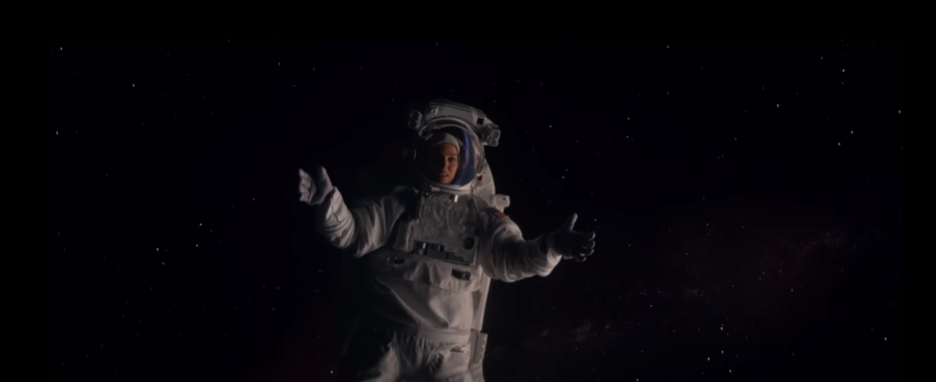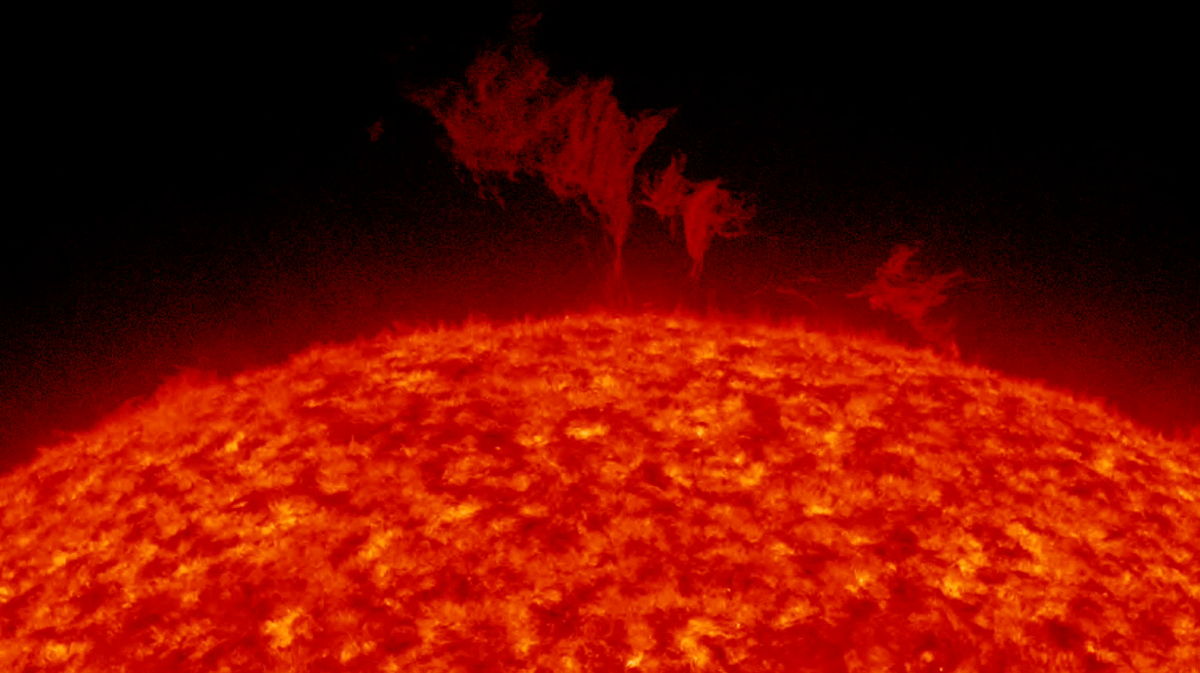'Lucy in the Sky' Explained: A Q&A with Director Noah Hawley
Hawley reveals what inspired the film.

"Lucy in the Sky," a new feature film, stars Natalie Portman as fictional astronaut Lucy Cola. The film tells the story of how Cola was changed by her first flight to space as part of NASA's Space Shuttle program. The audience follows Cola through an extramarital affair, mental health struggles and, ultimately, a tragic breakdown. The film is loosely based on the real-life story of former NASA astronaut Lisa Nowak.
Space.com sat down with "Lucy in the Sky" director Noah Hawley, who previously created and wrote the FX television series "Fargo" and "Legion," to chat about the movie, the inspirations behind it and what its impact might be.
Related: Too Emotional for Space — 'Lucy in the Sky' Reinforces Stereotypes
Space.com: If you could describe your initial inspiration for the movie's premise and tone?
Noah Hawley: It came to me as a script, in an already sort of fictionalized script, and what I was immediately struck by was, it looks like it's a journey about space but really it's a movie about life on Earth and really it's about this woman's interior journey. And yet, because of the space elements, the underwater training sequence, etc., it had a sense of scale and the possibility for a cinematic telling that made it exciting to me because I didn't, I guess if I was gonna make a movie, it had to satisfy certain criteria, it had to justify being on a big screen versus a small screen.
And that didn't necessarily mean scale like a Marvel movie, a "Star Wars" movie, but it needed to be visual enough, dynamic enough. And then, you know what also appealed to me immediately was the idea that we could create a theatrical experience by using things that people normally take for granted which is the screen itself, and the sound itself to create a subjective experience. When the universe seems big to her, the image is big. When life seems small, it's small and the sound operates accordingly. And not as a gimmick, but as a way to really try to create a state of mind where you're in her experience.
Space.com: Now, the movie has gained some attention for being loosely based on a true story. And it seems fairly obvious that it is based on events from the life of former NASA astronaut Lisa Nowak. How much did this true story influence the film?
Get the Space.com Newsletter
Breaking space news, the latest updates on rocket launches, skywatching events and more!
Noah Hawley: The first thing that I read was that it was already a fictionalized story. I was aware that there had been a real-life incident. It wasn't my job or my goal to tell that specific story, but I was interested in these two images side by side. One was a woman, Natalie Portman, in a close-up in a helmet in space and the other was a mugshot and the idea of how this person who's literally on top of the world ends up in this place.
And in order to do that myself, I had to understand the journey she was on but I also had to understand what journey an audience is going to take with her and not just watch her and judge her. So there were certain elements, like in the original script she had three children and it was like 'well, it's harder for me to root for her if she's also cheating on children. So I don't think we need to burden the story with that because the number of people who are just going to say 'I'm out' is much bigger.'
You know really what was interesting to me was to remind an audience that at the heart of a tabloid story are human beings with dignity who make mistakes and have ruined everything. And then their punishment is they ruined everything and lucy has lost the things that matter to her most. She doesn't get to go back into space, she has lost her marriage, etc. So why do we need to reduce her to a punchline?
And whether it's a fictionalized story or real life, I think that applies. There's no reason that any of us, when our private mistakes are aired publicly, what we should get from our community is empathy and support and understand the fact that this is a tragic story, it's not a punchline.
Space.com: While this is only very loosely based on Lisa's story, do you think this movie will make people think differently about her as a real-life person?
Noah Hawley: I really don't know. You know, I love the movie American Hustle but I never held it to the standard of actually being the Abscam story. I didn't even know if those characters have anything to do with that story.
I know that we're in a moment in history where reality and the perception fo reality are kind of two different things. But my hope would be that she's already had so much of her private life aired publicly that maybe we don't talk about her at all, and that this movie is sort of allowed to be a story about this woman's existential crisis and her fall and redemption that is really specific to Natalie's journey and not project that onto real people.
Space.com: The movie really focuses on Lucy's mental health and how it devolves and changes. There have been many studies investigating the effects of spaceflight on mental health and the psychology of being an astronaut, did you look to any of those studies to guide you in making this film?
Noah Hawley: I did, and I obviously read a lot of memoirs and it's not the position of hte film to say that the journey that Lucy goes on and her break with reality is a common experience. But it is a movie about transformation and I think it's safe to say that many astronauts have been transformed by the experience of going up into space. Many of them have become very fervent environmentalists, some of them have come back and started to explore much more their creative side or their artistic side.
And I think that most of us can relate to having a moment of awe in which we see our lives with a new perspective and the reality for Lucy's character is that she's always ever focused on what, where, when and how and she's never really thought about why. And the healthy thing to do would've been to come back and to take the time off and to sort of go huh, that was an experience that I can't really categorize, so let me think about that.
But instead what she did was go "I've gotta go back," and she just threw herself into the work and she wasn't sleeping and she wasn't necessarily making the healthiest choices. And I think that just as I tried not t make this story about every woman, I also tried to make sure it's not a story about every astronaut.
Space.com: So this is one of the very few movies that feature a woman as an astronaut, specifically in the lead role. I wonder if people might be confused or disappointed by the fact that it's a rare moment where we have a female astronaut, and her role is that she's too emotional and unhinged to go back to space.
Noah Hawley: Yeah, I mean I think that's obviously a danger of it, and it's certainly something that I wrestled with. I really didn't want to make a movie who fell apart because she was too emotional about a man. So it's very important that the affair at the center of the story was a symptom of a larger existential crisis that she was having. And I think it's essential that we make empowering and inspiring stories about women.
But I also think that we have to be able to tell stories about women who fail, women who make mistakes, without judging them in the same way. You know, Brad Pitt gets to go into space and have an existential crisis and you like the movie or you dont like the movie but you never question its right to exist.
So, the reality of our lives is we learn more from our failures than from our successes. And I think that this journey and this sense of transformation is really important. That, to try to allow her to maintain her dignity and to empathize with her, even while acknowledging that she made mistakes, I think is really important.
Space.com: The main difference here is that, unlike Brad Pitt in Ad Astra, this is one of only a very small handful of movies that feature women as astronauts, so it will be setting a precedent and may be received differently.
Noah Hawley: I don't disagree, and I wrestled with it. Time will tell on some level how this movie is received, but my goal as a storyteller is always to try to understand something that I dont understand so that's what this exercise was for me. I want to make sure that for all of us here on Earth, that we have tales that help us to process how to exist in this world.
This interview was lightly edited for length and clarity.
- 'Lucy in the Sky' Review: Natalie Portman Stars in an Astronaut Love Triangle
- 'Lucy in the Sky' Trailer: No Diamonds Here, Just Astronaut Troubles
- Wild 'Lucy in the Sky' Trailer Quotes Apollo 11's Michael Collins
Follow Chelsea Gohd on Twitter @chelsea_gohd. Follow us on Twitter @Spacedotcom and on Facebook.
Join our Space Forums to keep talking space on the latest missions, night sky and more! And if you have a news tip, correction or comment, let us know at: community@space.com.

Chelsea “Foxanne” Gohd joined Space.com in 2018 and is now a Senior Writer, writing about everything from climate change to planetary science and human spaceflight in both articles and on-camera in videos. With a degree in Public Health and biological sciences, Chelsea has written and worked for institutions including the American Museum of Natural History, Scientific American, Discover Magazine Blog, Astronomy Magazine and Live Science. When not writing, editing or filming something space-y, Chelsea "Foxanne" Gohd is writing music and performing as Foxanne, even launching a song to space in 2021 with Inspiration4. You can follow her on Twitter @chelsea_gohd and @foxannemusic.









